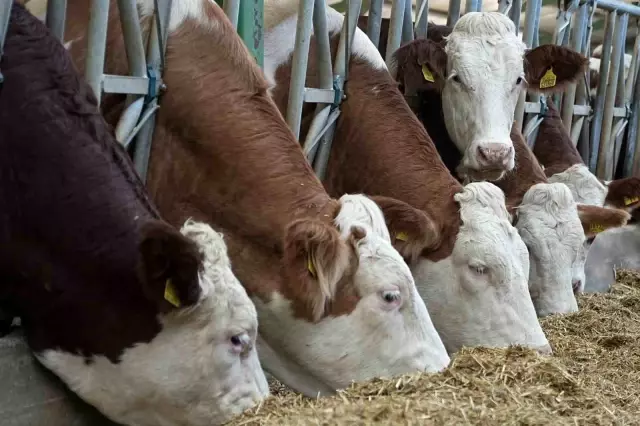|
In recent weeks, Turkey has halted imports of livestock due to the outbreak of bluetongue disease in cattle across Europe.
In the past month, bluetongue disease has been reported in many animals in several European countries. Following the rapid spread of the disease, some European countries have suspended exports. Experts stated that only Poland and Hungary have kept their exports open, while Turkey has stopped livestock imports as a precaution. They also emphasized that producers need to enhance biosecurity measures on their farms, stating that precautions must be maintained at the highest level. "EXPORTS FROM POLAND AND HUNGARY ARE CONSIDERED HIGHLY LIKELY TO OPEN"Stating that no cases have been reported in Poland and Hungary yet, but that intensive testing is being conducted there, breeding livestock producer Tarkan Gani said, "Bluetongue disease has currently been observed in countries like the Netherlands, Denmark, Germany, and Italy. Due to its frequent occurrence in the last month, these countries have banned livestock exports. They are not currently offering animals for sale or sending them abroad. Although no cases have been reported in Hungary and Poland, our government has closed imports to those countries as a precaution. Currently, there is no import of breeding livestock from Europe. There are operators and breeders who had previously obtained permits. In fact, some businesses have even made deposits there. They are currently waiting and undergoing an intensive testing process. After the testing process, the opening of imports from Hungary and Poland is considered highly likely," he stated.  THERE HAS BEEN NO OFFICIAL CASE REPORTED IN TURKEY YETEmphasizing that Turkey has taken necessary precautions, Gani said, "The Republic of Turkey uses the world's strictest health specifications. Animals are not brought in easily. They undergo specific tests. After being brought to Turkey, their blood is taken again. If anything negative is found, the animals are sent for slaughter. As of now, I have not heard any official statement regarding bluetongue from official sources in our country. All efforts of our government are to prevent this disease from entering our country," he said. MEASURES MUST BE MAINTAINED AT A HIGH LEVELGani stated, "There are various cattle diseases in the world. One of these diseases is bluetongue. So far, it has not shown any effect on humans. However, bluetongue causes high fever and abortion in infected animals. This causes serious damage to our national economy. Therefore, the measures taken by our government are quite correct. Biosecurity measures must be taken in all farms, not just for bluetongue. They can use slaked lime in the farms. This is the most accessible and cost-effective method. We should not allow anyone without galoshes into the farms. They can use disposable aprons. We do not accept guests from outside. When we do accept, we apply these biosecurity conditions. We have thousands of animals on our farm. If one gets infected, it means all of them will be sick. Therefore, we need to keep our precautions at the highest level," he expressed. WHAT IS BLUETONGUE DISEASE?Bluetongue disease, caused by a virus known as the bluetongue virus (BTV) belonging to the reoviridae family, is a viral infection that can occur in both large and small ruminants such as sheep, goats, cattle, and camels. Although sheep are the most severely affected, bluetongue disease can affect all ruminant species, including goats, cattle, camels, deer, and African antelopes. It can be transmitted by insects, primarily biting midges. Healthy-looking cattle and goats can carry high levels of the virus and provide additional sources of infection. Symptoms in cattle are rare compared to those in sheep, but they may resemble the symptoms seen in sheep. Infected sheep suffer damage to blood vessels, leading to bleeding (internal bleeding), oxygen deficiency in the blood, and necrosis (death) of affected tissues. Infections are more pronounced in young lambs and can have a high mortality rate. There is no treatment for bluetongue disease, and vaccination of animals is necessary for prevention. If animals infected with bluetongue disease are detected, the villages where the animals live are usually placed under quarantine, and that village is closed to animal entry and exit for a period of time. CAN IT TRANSMIT TO HUMANS?Bluetongue disease does not transmit to humans even if they come into contact with sick animals, consume their milk, or come into contact with their wool.
|